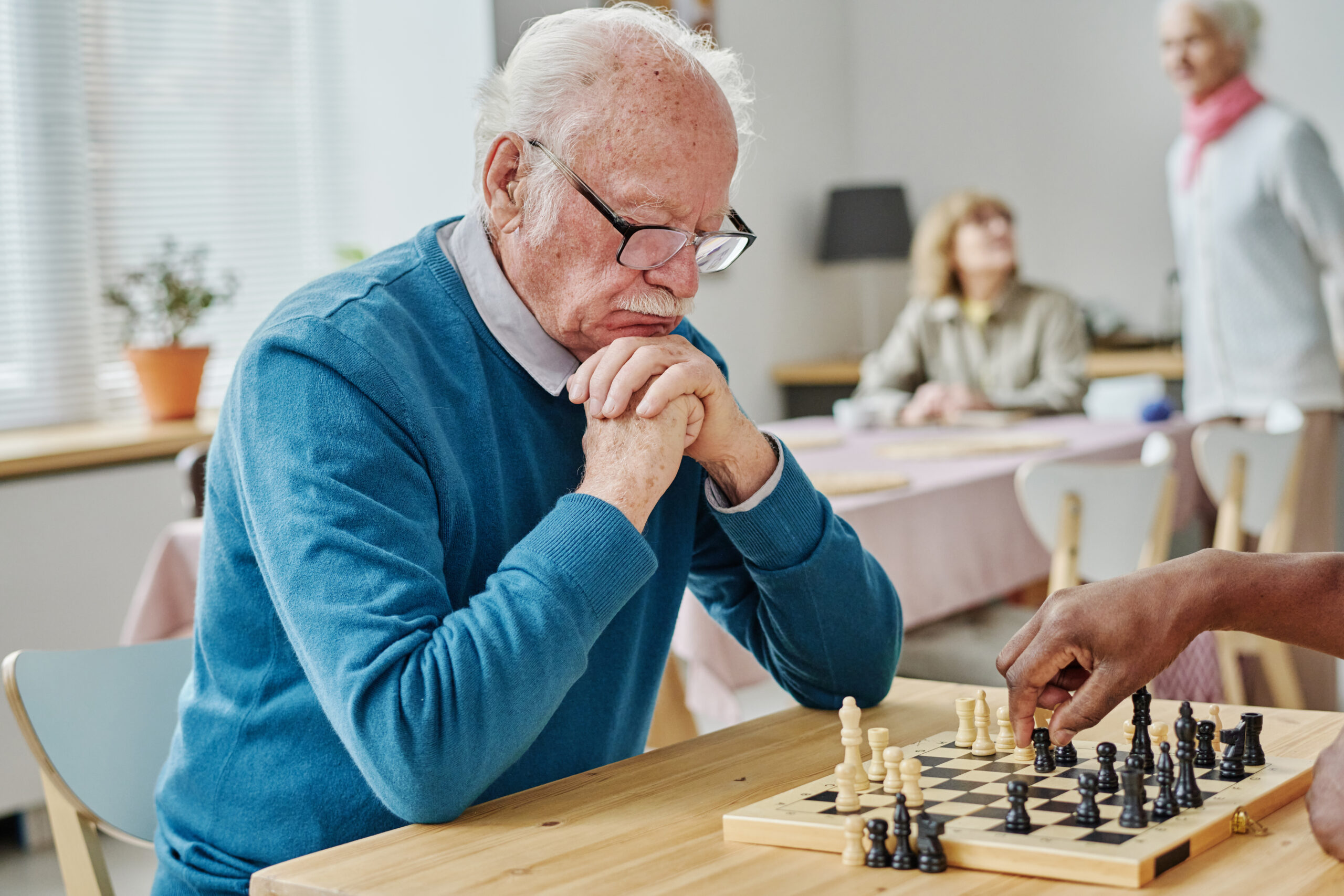Your brain is your most valuable asset. It holds your memories, drives your creativity, manages your relationships, and defines who you are. Just like your body, your brain needs regular exercise to stay strong, flexible, and resilient.
The exciting news? Groundbreaking 2025 research now proves that keeping your brain active can actually reverse years of cognitive aging — and that lifestyle changes work regardless of your age, genetics, or current health status.
A landmark clinical trial published in July 2025 found that older adults who followed a structured program of mental engagement, physical activity, healthy eating, and social connection performed as well on cognitive tests as people one to nearly two years younger than their actual age. This wasn’t just a slowing decline — it was an actual improvement.
This comprehensive guide will show you exactly how to maintain and even enhance your mental agility, backed by the latest 2024-2025 research and practical strategies you can start today.
The 2025 Breakthrough: U.S. POINTER Study Results
In July 2025, the Alzheimer’s Association released results from the U.S. POINTER Study — the largest lifestyle intervention trial ever conducted for brain health. The findings are transformative:
What They Tested:
- 2,111 adults ages 60-79 who were sedentary and at elevated risk for cognitive decline
- Two-year intervention comparing structured vs. self-guided lifestyle programs
- Five U.S. academic medical centers
- Diverse population (31% from underrepresented ethnic groups)
What They Found:
- Both lifestyle interventions improved cognitive function — not just slowed decline, but actual improvement
- The structured program produced even greater gains, with participants performing like people 1-2 years younger
- Benefits were consistent regardless of age, sex, ethnicity, genetic risk (APOE-e4), or heart health status
- 89% of participants completed the full two-year program
The Structured Program Included:
- Physical exercise (aerobic + strength training)
- MIND diet (Mediterranean-DASH combination)
- Cognitive training (BrainHQ and other mental challenges)
- Social engagement activities
- Regular health monitoring and goal-setting
Why This Matters:
As principal investigator, Dr. Laura Baker explained: “These positive results underscore the message that healthy behavior has a powerful impact on brain health.” The Alzheimer’s Association is now investing $40 million to bring these interventions to communities nationwide.
The Science: Why Mental Agility Matters More Than Ever
What Happens to the Brain as We Age
Normal aging brings some cognitive changes:
- Processing speed slows slightly
- It may take longer to learn new information
- Multitasking becomes more challenging
- Occasional word-finding difficulties increase
However, these are NOT inevitable or irreversible. Research shows that the brain maintains remarkable plasticity — the ability to form new neural connections — throughout life.
Mental Agility vs. Dementia
It’s crucial to understand the difference:
Normal Aging:
- Occasionally forgetting a name but remembering it later
- Misplacing keys sometimes
- Taking longer to recall information
- Mild difficulty multitasking
Warning Signs of Cognitive Decline:
- Forgetting recently learned information
- Difficulty completing familiar tasks
- Confusion about time or place
- Problems with language (beyond occasional word-finding)
- Poor judgment affects daily life
- Withdrawal from social activities
The 2024 Lancet Commission: 45% of Dementia Is Preventable
The 2024 Lancet Commission on Dementia Prevention — the most comprehensive analysis of dementia risk factors ever conducted — found that 45% of all dementia cases worldwide could potentially be prevented or delayed by addressing 14 modifiable risk factors:
Early Life (under 18):
- Less education
Midlife (18-65):
- Hearing loss
- High blood pressure
- High LDL cholesterol (NEW in 2024)
- Obesity
- Excessive alcohol consumption
- Traumatic brain injury
Later Life (65+):
- Smoking
- Depression
- Social isolation
- Physical inactivity
- Diabetes
- Air pollution
- Vision loss (NEW in 2024)
The two new risk factors added in 2024 — high LDL cholesterol and untreated vision loss — account for an additional 9% of preventable dementia cases.
Key insight: The 2024 Lancet Commission emphasizes that it’s never too late to reduce your risk. Actions taken at any age can make a difference.
Brain Training That Actually Works: The 2025 Evidence
The BrainHQ Breakthrough
A groundbreaking McGill University study published in late 2025 became the first human clinical trial to demonstrate that online brain training can actually rejuvenate aging brain systems:
What They Found:
- Older adults using BrainHQ for just 10 weeks showed restored cholinergic function
- The cholinergic system is critical for learning and memory, and typically declines with age
- PET scans confirmed measurable biochemical changes in the brain
- Researchers described it as “effectively turning back the brain’s clock by a decade.”
Why This Matters:
Lead researcher Dr. Etienne de Villers-Sidani explained: “A lot of people assume crossword puzzles or reading are enough to keep the brain sharp. But not all activities truly promote neuroplasticity.” The study suggests that speed-based, adaptive cognitive games that become progressively more challenging may be especially effective.
Computerized Cognitive Training: What the Research Shows
A 2024 meta-analysis in npj Digital Medicine examined 35 randomized controlled trials of computerized cognitive training (CCT) in people with mild cognitive impairment or dementia:
For People with Mild Cognitive Impairment:
- Significant improvements in verbal memory (effect size 0.55)
- Significant improvements in visual memory (effect size 0.36)
- Significant improvements in working memory (effect size 0.28)
Key Finding: The benefits of cognitive training were similar for both healthy older adults and those with mild cognitive impairment, suggesting these tools can help across the spectrum of mental abilities.
The Most Effective Brain Training Approaches
Based on 2024-2025 research, the most effective cognitive training:
1. Is Adaptive and Progressive
- Adjusts difficulty based on your performance
- Becomes more challenging as you improve
- Prevents you from plateauing
2. Targets Multiple Cognitive Domains
- Processing speed
- Attention and focus
- Memory (working, short-term, and long-term)
- Executive function (planning, problem-solving)
- Visuospatial skills
3. Is Practiced Regularly
- Consistency matters more than duration
- 15-30 minutes daily is more effective than longer sessions less frequently
4. Involves Novelty and Challenge
- Learning new skills is more beneficial than practicing familiar ones
- The brain grows through challenge, not comfort
Proven Strategies to Maintain Mental Agility
1. Cognitive Challenges and Puzzles
Why It Works: Puzzles and mental challenges create new neural pathways and strengthen existing connections. The key is novelty and progressive difficulty.
Best Practices:
- Crossword puzzles and word games — challenge vocabulary and memory
- Sudoku and number puzzles — enhance logical thinking and pattern recognition
- Jigsaw puzzles — improve visuospatial skills and patience
- Brain teasers and riddles — stimulate creative problem-solving
- Strategy games — develop planning and executive function
Pro Tip: Rotate between different types of puzzles to challenge multiple cognitive domains. If a puzzle type becomes too easy, move to a harder level or try something new.
2. Digital Brain Training Programs
Evidence-Based Options:
BrainHQ (by Posit Science)
- Backed by 100+ peer-reviewed studies
- Used in the U.S. POINTER trial
- Adaptive speed-based exercises
- The 2025 McGill study showed measurable brain changes after 10 weeks
Lumosity
- Wide variety of games targeting different cognitive skills
- Tracks progress over time
- Adaptive difficulty
CogniFit
- Personalized training based on initial assessment
- Targets specific cognitive weaknesses
Recommended Approach:
- 20-30 minutes daily, 4-5 times per week
- Track your progress to stay motivated
- Don’t just play games you’re already good at — challenge yourself
3. Learning New Skills
Why It’s Powerful: Learning something entirely new forces the brain to create new neural networks. This is one of the most potent stimuli for neuroplasticity.
High-Impact Options:
Learning a New Language
- Engages multiple brain regions simultaneously
- Improves memory, attention, and executive function
- Apps like Duolingo, Babbel, or Rosetta Stone make it accessible
- Even 15 minutes daily can produce benefits
Learning a Musical Instrument
- Combines motor skills, auditory processing, memory, and creativity
- Playing music has been shown to increase gray matter volume
- It’s never too late to start — adult learners show brain benefits
Learning New Technology
- Using smartphones, tablets, and computers engages problem-solving
- A 2025 study found that “digital isolation” (not using technology) increases dementia risk
- Video calling, social media, and online learning all provide cognitive stimulation
Other Skill-Building Activities:
- Photography
- Cooking new cuisines
- Woodworking or crafts
- Dancing (combines physical and cognitive challenges)
- Playing chess or strategic games
4. Reading and Lifelong Learning
Why It Works: Reading is one of the most comprehensive mental workouts — it engages memory, visualization, language processing, and abstract thinking simultaneously.
Maximize the Benefits:
- Read widely — fiction, non-fiction, different genres and topics
- Join a book club — adds social engagement and discussion
- Take courses — online platforms like Coursera, edX, and MasterClass offer endless learning opportunities
- Listen to podcasts — stimulates auditory processing and learning
- Write — journaling, memoir writing, or creative writing engages different cognitive processes than reading
5. Arts and Crafts
Research Support: The original study cited in the blog found that pottery, quilting, and creative activities reduced the risk of memory loss by 30-50% in people with mild cognitive impairment.
How It Works:
- Engages fine motor skills and hand-eye coordination
- Requires planning, problem-solving, and creativity
- Provides a sense of accomplishment and purpose
- Often involves learning new techniques
Options to Explore:
- Painting and drawing
- Knitting, crocheting, or quilting
- Pottery and ceramics
- Jewelry making
- Woodworking
- Scrapbooking
- Model building
6. Board Games and Social Gaming
Double Benefit: Board games combine cognitive challenge with social interaction — two influential factors for brain health.
Best Options:
- Chess — the ultimate strategic thinking game
- Scrabble — vocabulary and word formation
- Bridge — memory, strategy, and partnership
- Mahjong — pattern recognition and strategy
- Trivial Pursuit — memory recall across topics
- Settlers of Catan — resource management and strategic planning
Research Note: A 2024 study found that cognitively stimulating leisure activities, including board games, are associated with a reduced risk of dementia.
Physical Activity: Your Brain’s Best Friend
The 2025 Evidence
A May 2025 comprehensive review in Sports Medicine – Open analyzed studies from 1970 to 2025 on exercise and cognitive health:
Key Findings:
Aerobic Exercise:
- Improves memory, executive functions, and mood regulation
- Increases cerebral blood flow
- Promotes neurogenesis (growth of new brain cells)
- Increases brain-derived neurotrophic factor (BDNF) — a protein essential for learning and memory
Resistance Training:
- Enhances visuospatial processing and executive functions
- Stimulates insulin-like growth factor-1 (IGF-1)
- Increases blood flow to the prefrontal cortex
Combined Training:
- The most beneficial approach
- Multicomponent programs show the most significant cognitive improvements
The November 2025 Nature Medicine Study
A landmark study published in Nature Medicine (November 2025) provided perhaps the most compelling evidence yet for exercise and brain health:
What They Found:
- Higher physical activity (measured by pedometer) was associated with slower cognitive and functional decline in people with elevated amyloid (Alzheimer’s pathology)
- Physical activity was associated with slower tau protein accumulation — a key driver of Alzheimer’s progression
- Benefits showed a dose-response relationship — more activity, more protection
- Benefits plateaued at moderate activity levels (you don’t need to be an athlete)
The Bottom Line: Exercise appears to protect the brain even in people who already have Alzheimer’s pathology building up.
Recommended Physical Activities
Aerobic Options:
- Brisk walking (150 minutes/week minimum)
- Swimming or water aerobics
- Cycling (stationary or outdoor)
- Dancing
- Tennis or pickleball
Strength Training:
- 2-3 sessions per week
- All major muscle groups
- Can be bodyweight, resistance bands, or weights
Mind-Body Activities:
- Tai Chi — shown to improve balance AND cognitive function
- Yoga — combines physical, breathing, and meditative elements
- Qigong — gentle movement with mental focus
Social Physical Activities:
- Walking groups
- Golf
- Doubles tennis
- Lawn bowling
- Group fitness classes
Social Connection: The Often-Overlooked Brain Booster
The 2024-2025 Research on Social Isolation
The evidence linking social connection to brain health has grown dramatically:
2024 Lancet Commission:
- Social isolation is one of 14 modifiable risk factors for dementia
- Isolation in later life accounts for 5% of all dementia cases globally
- This makes it one of the most significant preventable risk factors
2025 Research Findings:
A March 2025 study in the International Journal of Geriatric Psychiatry found:
- Persistent loneliness, especially in women, was associated with a higher risk of dementia and cognitive decline
- Social support appeared protective against cognitive decline
A July 2025 study found:
- Lonely dementia patients had lower cognitive trajectories throughout the disease
- Socially isolated patients experienced faster cognitive decline in the months before diagnosis
A February 2025 study in the Journal of Medical Internet Research examined “digital isolation”:
- Older adults who didn’t use technology (internet, smartphones, social media) had significantly higher dementia risk
- Digital engagement appears to provide cognitive and social benefits
Why Social Connection Matters
Social interaction:
- Requires complex cognitive processing (understanding others, responding appropriately)
- Provides emotional support that reduces stress hormones harmful to the brain
- Motivates physical activity and healthy behaviors
- Gives life meaning and purpose
- Challenges the brain in unpredictable ways
Strategies to Stay Connected
In-Person Options:
- Join clubs based on interests (book clubs, gardening clubs, hobby groups)
- Volunteer for causes you care about
- Take group classes (exercise, art, learning)
- Attend religious or spiritual gatherings
- Regular meals or activities with family and friends
Technology-Enabled Connection:
- Video calls with family and friends (FaceTime, Zoom)
- Social media to stay connected with the community
- Online groups and forums for interests
- Multiplayer games that involve social interaction
Intergenerational Connection:
- Spending time with grandchildren or younger people
- Mentoring programs
- Tutoring or teaching
- Sharing skills and wisdom with younger generations
The MIND Diet: Eating for Brain Health
The MIND diet (Mediterranean-DASH Intervention for Neurodegenerative Delay) was used in the U.S. POINTER trial and is specifically designed to protect brain health.
Foods to Emphasize
Green Leafy Vegetables — at least six servings/week
- Spinach, kale, collard greens, Swiss chard
- Rich in brain-protective nutrients
Other Vegetables — at least one serving/day
- Variety of colorful vegetables
Berries — at least two servings/week
- Blueberries, strawberries, blackberries
- High in antioxidants linked to brain health
Nuts — at least five servings/week
- Walnuts, almonds, pistachios
- Healthy fats and vitamin E
Whole Grains — at least three servings/day
- Oatmeal, quinoa, brown rice, whole wheat
Fish — at least one serving/week
- Salmon, sardines, mackerel, trout
- Omega-3 fatty acids
Beans — at least four servings/week
- Fiber and protein
Poultry — at least two servings/week
Olive Oil — as primary cooking oil
Wine — optional, one glass/day maximum
Foods to Limit
- Red meat — less than four servings/week
- Butter and margarine — less than one tablespoon/day
- Cheese — less than one serving/week
- Pastries and sweets — less than five servings/week
- Fried and fast food — less than one serving/week
Research Support
Studies show the MIND diet is associated with:
- Slower cognitive decline
- Reduced Alzheimer’s risk
- The brain that appears 7.5 years younger in adherent individuals
Sleep: The Brain’s Nightly Reset
Why Sleep Matters for Mental Agility
During sleep, the brain:
- Consolidates memories from the day
- Clears waste products (including amyloid beta linked to Alzheimer’s)
- Repairs and regenerates neural connections
- Processes emotional experiences
The Research
Poor sleep is increasingly recognized as a risk factor for cognitive decline:
- Chronic sleep deprivation impairs memory, attention, and decision-making
- Sleep disorders (especially sleep apnea) are associated with increased dementia risk
- The glymphatic system — the brain’s waste-clearing mechanism — is most active during deep sleep
Sleep Hygiene for Brain Health
- Aim for 7-8 hours per night
- Maintain consistent sleep/wake times — even on weekends
- Limit screen time before bed (blue light disrupts melatonin)
- Keep the bedroom calm, dark, and quiet
- Avoid caffeine after noon
- Limit alcohol — it disrupts sleep quality
- Get morning sunlight — helps regulate circadian rhythms
- Address sleep disorders — talk to your doctor if you snore, gasp, or feel unrested
Managing Health Conditions That Affect the Brain
The 2024 Lancet Commission emphasizes that managing chronic health conditions is crucial for brain health:
Blood Pressure
- High blood pressure damages the blood vessels supplying the brain
- Midlife hypertension is a significant dementia risk factor
- Work with your doctor to maintain healthy blood pressure
Cholesterol
- High LDL cholesterol (newly identified in 2024) is a dementia risk factor
- May need medication if lifestyle changes aren’t sufficient
Blood Sugar
- Diabetes increases dementia risk significantly
- Prediabetes also appears to be a risk factor
- Diet, exercise, and medication (if needed) can help
Hearing and Vision
- Hearing loss is one of the most significant modifiable risk factors
- Get your hearing checked regularly
- Use hearing aids if recommended — studies show they reduce cognitive decline
- Vision loss (newly added in 2024) is also a risk factor
- Regular eye exams and appropriate correction are important
Depression
- Depression, especially persistent depression in midlife, increases dementia risk
- Treatment (therapy, medication, lifestyle changes) can help
- Don’t dismiss depression as “normal” with aging
How Professional Home Care Supports Mental Agility
For seniors living at home, professional caregivers can provide essential support for maintaining cognitive health.
Cognitive Engagement Support
Daily Mental Stimulation:
- Playing board games, cards, and puzzles together
- Doing crossword puzzles or brain teasers
- Engaging in meaningful conversation
- Reading aloud or discussing books
- Helping with digital brain training programs
Encouraging New Learning:
- Assisting with technology use (tablets, smartphones, video calls)
- Supporting hobby activities (arts, crafts, music)
- Encouraging reminiscence activities that stimulate memory
Physical Activity Support
- Accompanied daily walks
- Encouraging and assisting with prescribed exercises
- Transportation to exercise classes, pools, or gyms
- Ensuring safety during physical activities
Social Connection Support
- Providing companionship and conversation
- Transportation to social activities, clubs, and religious services
- Helping maintain contact with family and friends
- Facilitating video calls with distant loved ones
Nutrition Support
- Preparing brain-healthy meals (MIND diet principles)
- Grocery shopping for nutritious foods
- Ensuring adequate hydration
- Encouraging regular, balanced meals
Health Management Support
- Medication reminders to ensure brain-protective medications are taken
- Transportation to medical appointments
- Monitoring for changes in cognition and alerting family/providers
- Ensuring hearing aids, glasses, and other devices are used properly
Sleep Support
- Helping maintain consistent sleep schedules
- Creating calm evening routines
- Monitoring for sleep problems to report to healthcare providers
All Heart Home Care: Your Partner in Cognitive Wellness
At All Heart Home Care, we understand that maintaining mental agility is essential for quality of life and independence. Our professionally trained caregivers are committed to supporting your cognitive health through:
✓ Daily cognitive engagement — puzzles, games, conversation, and mental stimulation
✓ Technology assistance — helping with brain training apps, video calls, and digital connection
✓ Physical activity support — encouraging movement and accompanying on walks
✓ Social companionship — meaningful interaction that keeps the mind active
✓ Brain-healthy meal preparation — following MIND diet principles
✓ Medication management — ensuring all prescribed medications are taken correctly
✓ Transportation — to exercise classes, social activities, and medical appointments
✓ Health monitoring — observing for changes and communicating with families
Our rates begin at $37/hour, with transparent pricing, no hidden fees, and personalized care plans tailored to your needs.
Call us at (619) 736-4677 for a free in-home consultation.
We’ll assess your needs, discuss your cognitive wellness goals, and develop a care plan to keep your mind sharp and your life fulfilling.
Key Takeaways: Your Mental Agility Action Plan
Based on the latest 2024-2025 research, here’s your evidence-based action plan:
Daily Actions
- Do something mentally challenging — puzzles, brain training, learning
- Stay physically active — even a 30-minute walk helps
- Connect with others — conversation, calls, social interaction
- Eat brain-healthy foods — emphasize vegetables, berries, fish, nuts
- Get quality sleep — 7-8 hours with good sleep hygiene
Weekly Goals
- Learn something new — a skill, language, hobby, or topic
- Engage in strength training — 2-3 times per week
- Participate in social activities — clubs, groups, family gatherings
- Play games with others — board games, cards, social gaming
Ongoing Habits
- Manage health conditions — blood pressure, cholesterol, blood sugar
- Address hearing and vision — get checked and use corrective devices
- Stay mentally challenged — keep increasing difficulty as you improve
- Maintain purpose and engagement — stay involved in meaningful activities
The Most Important Message
The U.S. POINTER study proved that lifestyle changes can protect and even improve cognitive function. The benefits were seen regardless of age, genetics, or health status.
As the Alzheimer’s Association states: “These findings will transform the way our country approaches brain health.”
Your brain is worth the investment. Start today.
Research Sources (2024-2025)
✓ U.S. POINTER Study (July 2025) — 2,111 participants; structured lifestyle intervention improved cognition; published in JAMA
✓ 2024 Lancet Commission on Dementia Prevention — 45% of dementia potentially preventable; 14 modifiable risk factors identified
✓ McGill University/BrainHQ Study (October 2025) — Online brain training restored cholinergic function; effectively “turned back the brain’s clock by a decade.”
✓ npj Digital Medicine Meta-Analysis (January 2024) — Computerized cognitive training improves verbal memory, visual memory, and working memory in MCI
✓ JMIR Aging Scoping Review (May 2025) — Multimodal interventions (physical + cognitive training) show better outcomes than single interventions
✓ Sports Medicine – Open Review (May 2025) — Comprehensive analysis of exercise types and cognitive benefits
✓ Nature Medicine Study (November 2025) — Physical activity associated with slower tau accumulation and cognitive decline in at-risk adults
✓ Trends in Neurosciences Review (June 2024) — Exercise promotes neuroplasticity through multiple mechanisms
✓ International Journal of Geriatric Psychiatry (March 2025) — Persistent loneliness increases dementia and cognitive decline risk
✓ Journal of Medical Internet Research (February 2025) — Digital isolation significantly increases dementia risk
✓ Frontiers in Human Neuroscience (May 2024) — Loneliness contributes to cognitive impairment independent of other risk factors





